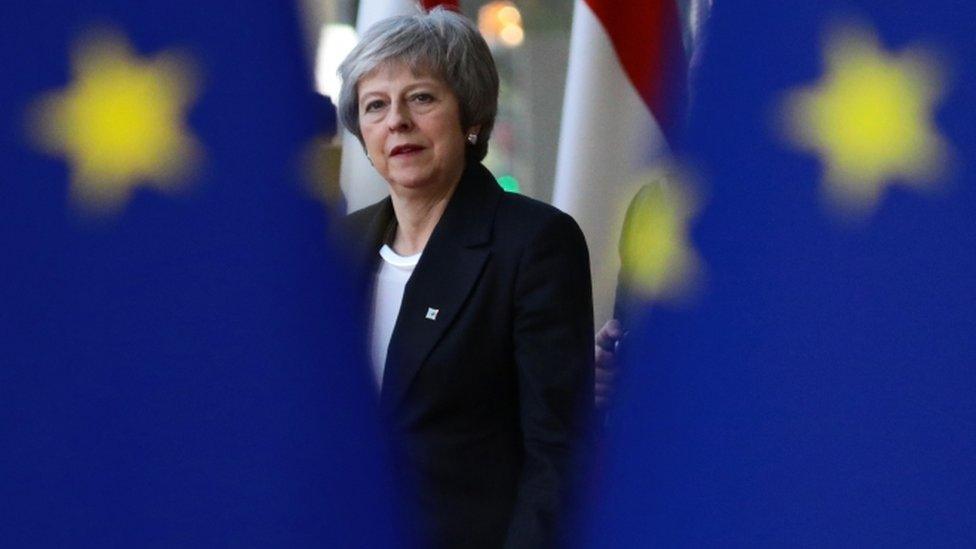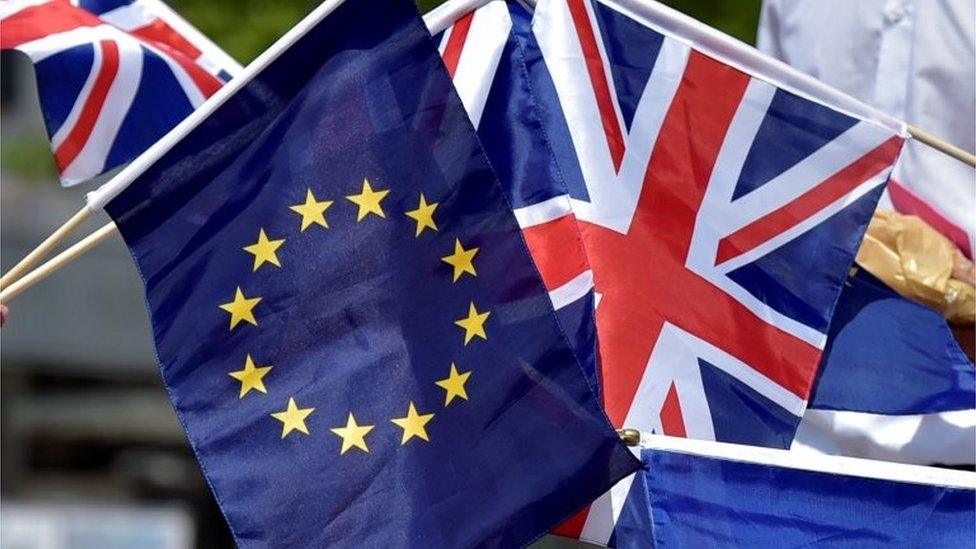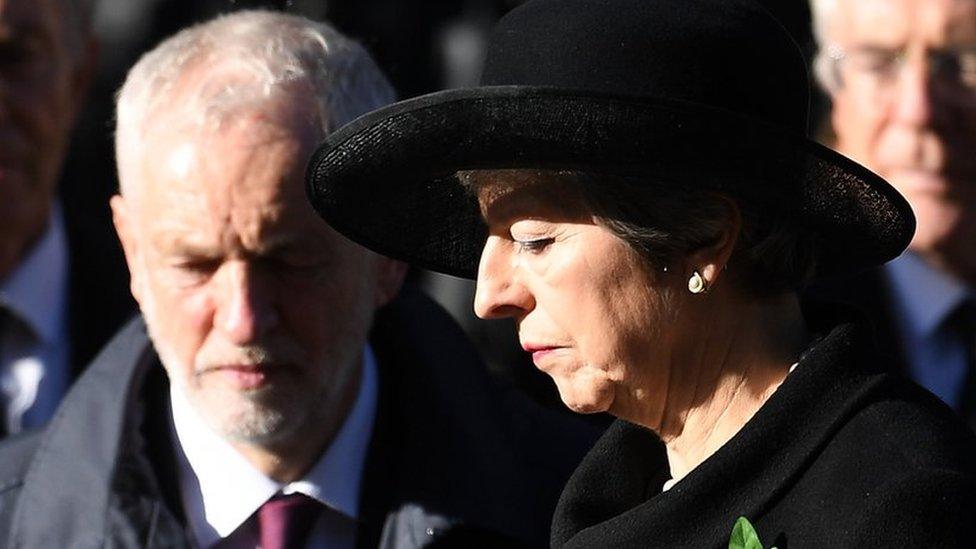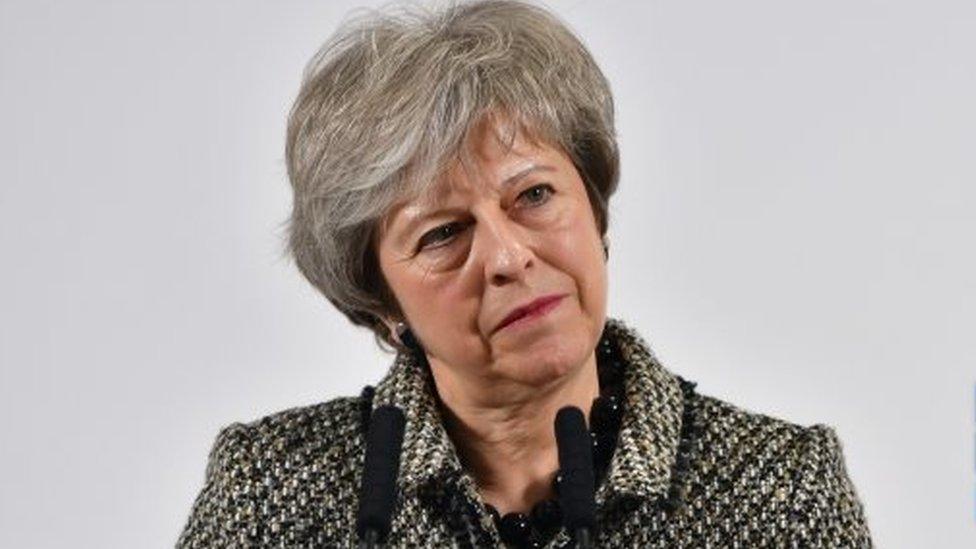No exit from Brexit rows... yet
- Published

The prime minister is still trying to secure a majority for her Brexit deal
New Year. Renewed argument over Brexit.
2019 is supposed to be the year the UK formally leaves the EU - the scheduled departure date is less than 12 weeks away.
But no matter how often the prime minister insists that is what will happen on 29 March, there is still considerable uncertainty.
MPs first have to debate and vote on the departure deal Mrs May has negotiated with the EU.
That includes a two-year transition period (during which current trade, travel and security arrangements would continue) while the UK and EU negotiate their longer-term relationship.
It also includes a controversial backstop arrangement to prevent border controls being imposed in Ireland in the event that future UK-EU relations are not agreed by the end of 2020.
Many Conservatives don't like the backstop because it treats Northern Ireland differently to the rest of the UK, which they perceive as a threat to the Union of Great Britain and Northern Ireland.
'Competitive advantage'
The SNP argues that it would give Northern Ireland a competitive advantage over Scotland in access to EU markets.
There's also concern that the backstop could become semi-permanent because it does not include any provision for the UK to - unilaterally - end it.
The EU insists that, if used, the backstop would be a temporary arrangement that it would be keen to replace because it bends existing EU rules.
The debate on all this resumes in the Commons on Wednesday and will run until the so-called meaningful vote on Tuesday 15 January.
The prime minister is still trying to secure a majority for her deal. But opposition from within her own party and from her partners in power, the DUP, seems too entrenched to overcome.
Assuming the vote is not delayed again, as it was before Christmas, the government is expected to lose.
To avoid outright defeat, it has been suggested ministers might propose an amendment allowing MPs to back Mrs May's deal on condition she seeks and secures fresh concessions and assurances from the EU.

It's not clear the EU has much more to give, but maybe it can do enough to help get the package through the Commons at a second time of asking.
If there is a second time, that is.
Because if the government loses (or has effectively lost) the first vote, Labour may try to bring it down by demanding a vote of no confidence.
If enough Conservative MPs and the DUP come back on side to ensure the government survives, then what?
The chances of an early general election, so desired by Labour, would be much reduced.
Labour might then choose to back an alternative Brexit plan and seek to build a new consensus in Parliament.
The three main suggestions are:
A no deal departure followed by negotiations with the EU to secure a Canada-style free trade agreement with lots of add-ons.
Fresh negotiations to secure a Norway-plus arrangement that would keep the UK in the European single market and (unlike Norway) in the customs union as well.
A further Brexit referendum, possibly testing support for Mrs May's deal against cancelling Brexit and remaining in the EU.
Some Cabinet ministers have suggested the government itself should lead this process and bring forward votes on the various options.
Options two and three would require extra time - an extension to the Brexit process under Article 50 - which requires the agreement of all 28 EU member countries.
Permission may well be granted if the UK is seeking a closer relationship with the EU than previously envisaged.
Exit clock
Any extension is likely to be short because there are European Parliament elections towards the end of May.
Those who suggest the UK could buy even more time by simply revoking Article 50 are mistaken.
European judges have said the UK can unilaterally cancel Brexit but only if it really wants to stay in the EU, not just to restart the exit clock.
Labour MPs are divided over another referendum but the idea already has the support of the SNP, the Liberal Democrats and some prominent Conservatives.
It is, of course, possible that Parliament fails to agree on that or any other potential way forward.

Jeremy Corbyn would like to force Theresa May into calling a general election
That would probably bring a general election back into play — although under the fixed-term parliaments act, that in itself would require backing from two thirds of MPs.
The SNP is also mulling the possibility of calling for another independence referendum - with Scotland's first minister Nicola Sturgeon promising an update on her preferred timetable "fairly soon".
The default position is that the UK as a whole leaves the EU - with or without a deal - on 29 March.
Without parliamentary backing for Mrs May's deal or some alternative plan, the UK would leave with no deal and no transition period.
Despite the preparations being made for that scenario, the government expects it to be seriously disruptive and to hit economic performance hard.
No deal is an outcome a majority of MPs almost certainly oppose — with more than 200 of them already urging the prime minister to rule it out.
Theresa May's response is that the best way to guard against no deal is for MPs to back her deal.
And so, in the new year, the renewed debate over Brexit sounds much as it did at the close of 2018.
Only now there's even less time to break the deadlock.
- Published7 January 2019
